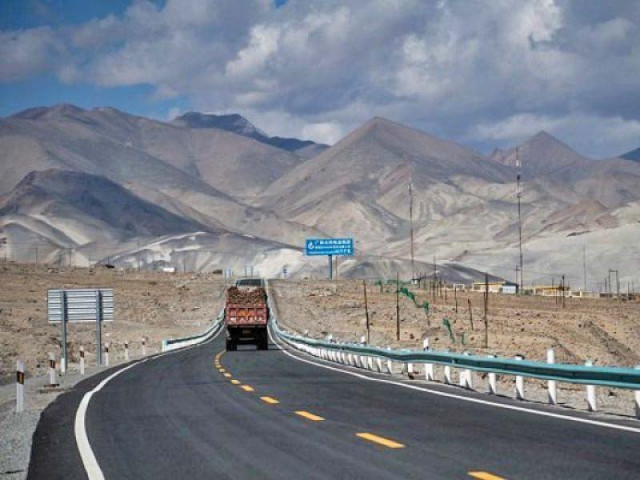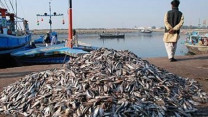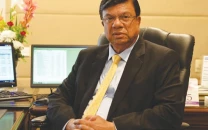Pakistan to improve CPEC visibility
Cabinet body reviews progress on ongoing projects and discusses future plan

The government has decided to improve visibility of the flagship China-Pakistan Economic Corridor (CPEC), days before foreign minister’s visit to Beijing where he will discuss new priorities of the country.
Headed by Planning Minister Asad Umar, the Cabinet Committee on CPEC on Thursday reviewed progress on implementation of ongoing projects and discussed the plan for the current fiscal year. Two new projects for inclusion in the CPEC framework were also discussed during the meeting.
“It has been decided that the focus of CPEC will be on agriculture and science and technology,” said Umar while talking to The Express Tribune. He said that the infrastructure and power projects were on track and now there was a need to work in new sectors.
In order to explore areas of cooperation in the agriculture sector, a meeting would soon be convened, said the minister. Umar said that the foreign minister would raise Pakistan’s CPEC priorities with the Chinese leadership in the upcoming visit.
The meeting also discussed the groundbreaking ceremony of the recently approved $6.8-billion Mainline-I project with the possibility of performing the ceremony in the current fiscal year, likely on January 1, 2021. However, the final date will be decided after the upcoming visit of Foreign Minister Shah Mehmood Qureshi to China, according to officials who attended the meeting.
Qureshi’s visit is also aimed at deliberating details of visit of the Chinese president to Pakistan as Islamabad is keen that President Xi should perform the groundbreaking ceremony of the strategically important project.
During his visit, the foreign minister would suggest October dates for holding the 10th Joint Cooperation Committee (JCC) meeting. JCC is a strategic decision-making body of CPEC and its meetings take place alternatively in Islamabad and Beijing.
Asad Umar would remain the co-chair of the JCC as a proposal to change the Pakistani counterpart has been shelved, according to government officials.
The 9th CPEC meeting had been held in Islamabad in November last year and the next meeting has to take place in Beijing. However, it was Pakistan’s desire that the 10th meeting should also take place in Islamabad aimed at showing the visibility of CPEC that remained dormant till recently.
The foreign minister offered to give in-camera briefing on CPEC to cabinet members after Railways Minister Sheikh Rashid highlighted some issues, according to the officials. After keeping it on the backburner for almost one and a half year, the government lately decided to revive CPEC. Asad Umar and Sheikh Rashid appreciated the role of CPEC Authority Chairman Asim Saleem Bajwa in reviving CPEC, according to the officials.
A prime minister-constituted committee on Thursday finalised its recommendations on the proposed CPEC Authority Bill. It has been proposed that the planning minister will remain co-chairman of the JCC, the authority should work under the Planning Division and CPEC Authority functions have been aligned with the government system, according to the officials.
Also, some proposed clauses related to limiting powers of the prime minister and ordering inquiries against public office holders have been deleted from the proposed new CPEC Authority bill.
In order to complete the road network from Gwadar, Quetta, Karachi to Peshawar, the meeting discussed the missing road links. The meeting was informed that work on the Hyderabad-Sukkur section may begin by March next year.
The meeting was also informed about the viability of Karachi-Quetta motorway. Nearly half of the project is economically feasible while the remaining has to be constructed with government’s funds. The Quetta-Chaman section was economically viable that could be constructed under the build-operate-transfer mode by the private sector.
During the meeting, the maritime affairs minister proposed to include Karachi Port development project in the CPEC scope. The committee referred the proposal to the Joint Working Group of CPEC for further deliberations.
It was also proposed during the meeting that Pakistan should now focus on converting Thar coal into liquid and use it for fertiliser manufacturing.
After the meeting, Umar tweeted about the committee proceedings. He stated that the government reviewed progress of CPEC projects during fiscal year 2019-20.
In the power sector, two projects with capacity of 1,980MW commissioned and ground breaking of one project was performed, according to Umar. He stated that financial close of two projects was achieved and concession agreements of two hydel projects with capacity of 1,800MW were also signed.
In the infrastructure sector, two projects achieved completion and Planning Commission gave approval for three projects, tweeted the minister.
Significant progress also achieved in development of Gwadar infrastructure, which is the linchpin of CPEC, he added. This included groundbreaking of Pak-China hospital and a technical & vocational centre. The phase-1 of project to supply five million gallons per day water from Saur dam to Gwadar city completed, said Umar.
“As we move forward the emphasis on industrial cooperation will increase,” stated Umar.
Published in The Express Tribune, August 14th, 2020.
Like Business on Facebook, follow @TribuneBiz on Twitter to stay informed and join in the conversation.



















COMMENTS
Comments are moderated and generally will be posted if they are on-topic and not abusive.
For more information, please see our Comments FAQ